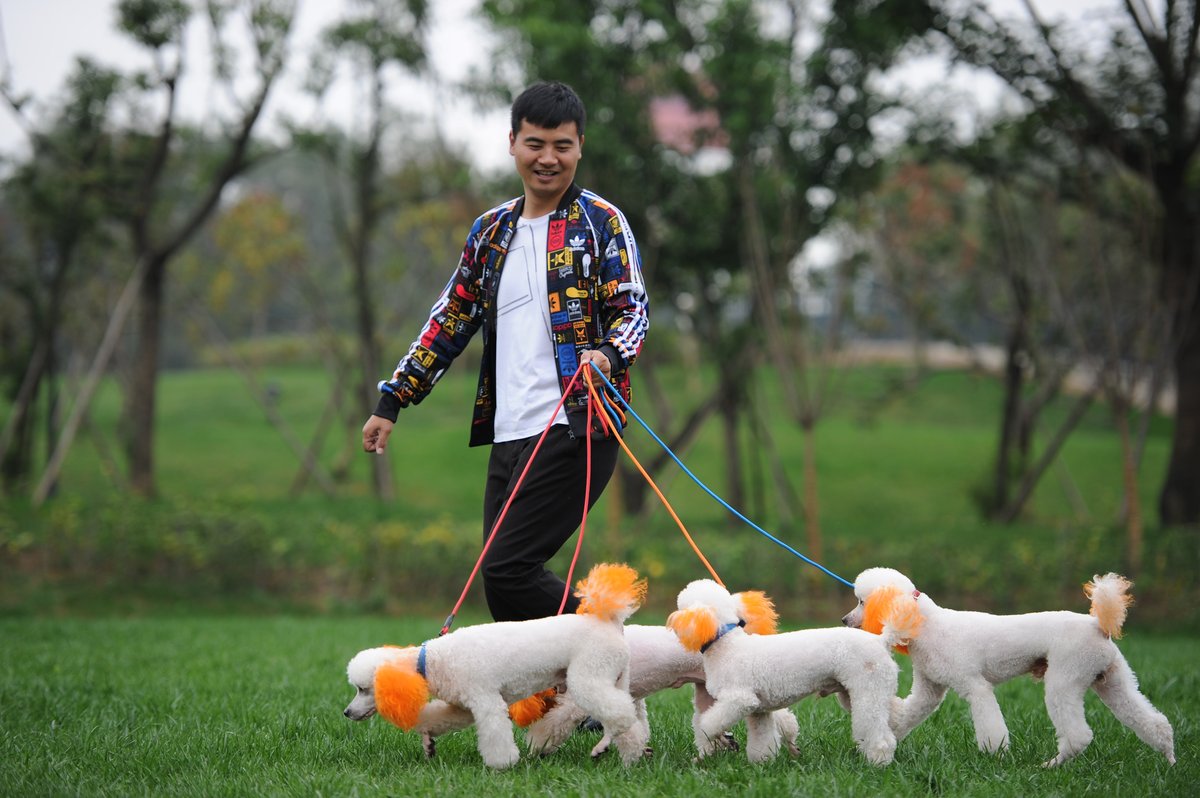Urban dog-owners turn to training schools for help with their pets, but controversies persist about training methods and lack of regulation in the industry
In Huang Yiyong’s boarding school in Guangzhou, Guangdong province, students all sleep in their own air-conditioned room with a balcony, and have access to a swimming pool and vast lawn on the 4,000-square-meter campus. They follow a customized daily schedule that begins anywhere between 6 to 8 in the morning, and ends with bedtime at around 10 at night.
The students take (often private) lessons, get plenty of time to rest in the dorms and play with each other in between mealtimes three times a day, plus plenty of breaks. From time to time, teachers or assistants will check their ears and feet, see whether they are sleeping or behaving well, and even help them attend to nature’s call; sometimes, they’ll even take the students “window shopping” on busy streets.
The catch, of course, is that these boutique services don’t cater to human students: Huang runs a boarding school for dogs, promising to train them to be more well-mannered, docile, and to break out of bad habits such as barking, protecting their food, relieving themselves indoors, being aggressive, or even biting. Eight trainers and several more assistants take care of around 30 dogs for “semesters” of one to three months at a cost of 4,000 to 10,000 yuan per month, covering their living expenses and training fees.
Huang himself is a pet-owner who first encountered pet-training in 2016 when he tried to find ways to train his golden retriever. He started his own school in 2019, and tells TWOC that behavioral issues are common among the hundreds of canine “students” he’s trained because they are full of energy but lack “freedom” to express it, due to their urban confines. They also often have owners who don’t know how to handle them. “It’s essential to train the owners how to manage their pets properly,” he says, explaining to TWOC that his school requires owners to attend at least one course on their dog’s graduation day, and another in the middle of the term if they can make it.
In recent years, pet training schools like Huang’s have emerged around China alongside the increase in pet ownership, coalescing into a booming “pet economy (宠物经济),” also known as “ta economy (它经济)” using the third-person pronoun for animals and inanimate objects, including pet food, veterinary hospitals, animal beauty salons, and even pet funerals. According to a 2020 report by iiMedia Research, a data mining and analysis firm, over 55 percent of pet owners regard their pets as their children, friends, or family members, creating a ready market for these (usually pricey) pet services.
Dog Dao Culture, a Hangzhou-based company established in 2020, claims to be China’s first online platform for training urban pet trainers. It boasts on its official site that over 50,000 out of its 140,000 registered users have paid for its online courses, and the 4,000 pet trainers who have graduated from the school earn an average monthly salary of 20,000 yuan.
However, the emerging sector has faced increasing controversies, including complaints over its high prices, unqualified trainers, unsatisfactory training results, and even scandals surrounding violent training methods, many of which may persist due to the lack of relevant regulations and industry standards.
Compared with the well-established pet-training sectors in many Western countries, pet-training schools in China have only become popular in the last two years, having largely evolved from police-dog training organizations, Xiang Yitian, a dog trainer from Beijing, told TMTPost, a Chinese digital publication focused on technology and media, this July.
Huang attributes the rise largely to social media platforms, especially short video-sharing platforms like Douyin (the Chinese version of TikTok) and Xiaohongshu (RED). According to him, the monthly enrollment at his school rose from two or three dogs in the first half of the year to around 30 after they shared videos of their students’ training routines and training tips on these platforms.
Indeed, pet content is becoming increasingly popular online, with many animals becoming “celebrities” in their own right. For instance, Little H and Little O, two cute and well-behaved shiba inu, have garnered over 246,000 and 937,000 fans on their respective accounts on the microblogging platform Weibo, since their appearance in the rural-themed reality show Back to the Field (《向往的生活》) in 2018.
Bai Yan, who claims to have trained Little H and Little O and their four celebrity offspring, tells TWOC that his school in Hangzhou has received increasing demand for trained pets for use in advertisements, TV shows, and other commercial activities in the last three years. “We have five or six such advertisement shootings per week on average,” says the 61-year-old dog trainer, who has coached over 1,000 dogs over the last four decades, first in the military and local police office. He has over 1 million fans on Weibo.
On Xiaohongshu, Huang shares tips and video clips of their training routine to the school’s more than 78,000 fans from time to time. On his WeChat Moments, there are daily updates on the admission of new students, their training, and their newfound skills—such as sitting, walking, or shaking hands obediently when commanded. The owners are happy and satisfied in the screenshots Huang shares of their feedback.
But not all pet-owners have good experiences with training schools. Last October, stand-up comedian Li Xueqin complained on a reality show that her dog learned nothing after one month’s training at the school. Economic View, a finance and economics publication under the China News Service, reported this February that a Shanghai resident surnamed Shen spent 7,000 yuan to have his Labrador (who became protective of its food and bit Shen and his family) trained at a highly recommended local school for 40 days, but the dog bit him again on the third day it returned from the school.
Similarly, Bai tells TWOC that many of his clients around the country come to him after trying and failing with local schools. He blames this on the lack of regulation in the industry and the low threshold for anyone to call themselves a pet trainer and start a business. “It takes me at least six months to train an intern who has graduated from college with a major in pet training; even trainers who have studied and worked with me for over five years cannot be called ‘senior’ in my opinion,” he says, “but some people claim to be ‘senior trainers’ simply after two weeks to one month’s study [at private institutions] at the cost of 10,000 to 20,000 yuan.”
The Ministry of Human Resources and Social Security did include pet trainers (宠物训导师) as one of 12 “new professions” as early as 2006 and issued provisional standards for pet trainers in 2008, specifying the qualifications they need in terms of hours of professional training, working experience, and examinations they need to pass. However, these standards were abolished in 2018 as part of an overall reform of the professional certification sector, and haven’t been replaced since.
The greatest concern of many pet owners is that their dogs will be poorly treated or even abused in training schools. A Xiaohongshu user from Shanghai, who used her dog’s name Oscar as her handle, shared on the platform last July that she’d sent Oscar to a local training school to correct his behavioral problems, but found during her mid-term visit that the school used shock collars to punish the dogs whenever they failed to follow the trainer’s command. Oscar’s owner found her dog thin and dull, and still traumatized long after she removed him from the school. Disillusioned, Oscar’s owner called on other pet owners to train their pets themselves rather than trust third parties, while several people shared similar horror stories about violence used in pet-training schools in comments under her post.
These worries have been aggravated this June by a viral video of Tang Weimin, the founder of Dog Dao Culture, kicking a dog in the face, pulling hard on its leash, and throwing it onto the floor repeatedly. Tang later explained on social media that the video, which was several years old, was meant to show his apprentice trainers how to train a neurotic dog that bit people—but this didn’t quell the public’s concerns about violent methods being normalized in the pet-training sector, as well as more abuses that may be going on behind closed doors.
In 2019, the founder of a Hangzhou pet training school who calls herself Xiao Tie told Sanxiaojie, a blog account on the Q&A platform Zhihu, that compared with the positive reinforcement training popular in Western countries, which calls for rewarding pets for good behavior rather than punishing them for bad behavior, traditional police dog-training methods from decades ago were still popular in China. These integrate coercion with reward, calling for shouting, electric shock, or pulling on a dog’s leash to deter unwanted behavior.
Xiao Tie, who herself only learned about positive reinforcement in the mid-2000s, and didn’t receive any formal training in it until 2011, believes punishment makes the dog fearful and leads to more problems. “If you do something wrong and someone scolds you, or even beats you, what happens? You’ll become fearful,” she says. “After fear builds to a certain level, you develop personality issues.”
Bai also tells TWOC that he adopted positive reinforcement training long ago, since traditional police-dog training methods don’t suit pet dogs. “Pets are to be pampered, not beaten,” he comments. To relieve owners of such worries, Bai welcomes them to visit the school any time they like, in addition to the weekly course they’re required to attend.
Huang says he also sends his clients frequent updates, including videos, on the training and daily life of their dogs. Having no faith in certificates for pet-trainers issued by private organizations in China, Huang doesn’t require his new recruits to have any particular certification, but closely observes their interaction with dogs during their one-month probation period on the job.
Price is another factor that deters pet owners, though school runners like Huang and Bai don’t think they make much profit from the business, in view of the human labor, food, and other costs, as well as the risk of being hurt: According to Huang, a neurotic golden retriever bit almost every trainer of his school during its four months with them in 2020. Bai meanwhile tells TWOC that his school mainly relies on shooting pet-themed videos to turn a profit.
Still, Bai believes this sector is promising for trainers “who are professional and caring.” His school has started to train pet cats, whose population outnumbered pet dogs last year in China, and other animal “actors” such as pigs and ducks. In addition to the school, he has also developed a property covering 1,500 mu (100 hectares) that offers nursing homes for pets, sets for shooting animal-themed movies and shows, and camping and tourism facilities for pet-owners who are often denied access to other recreational spaces if they bring along their pets.
He is full of confidence for the success of the project. “We [all] hope pets, as members of many families, can live better lives.”

















